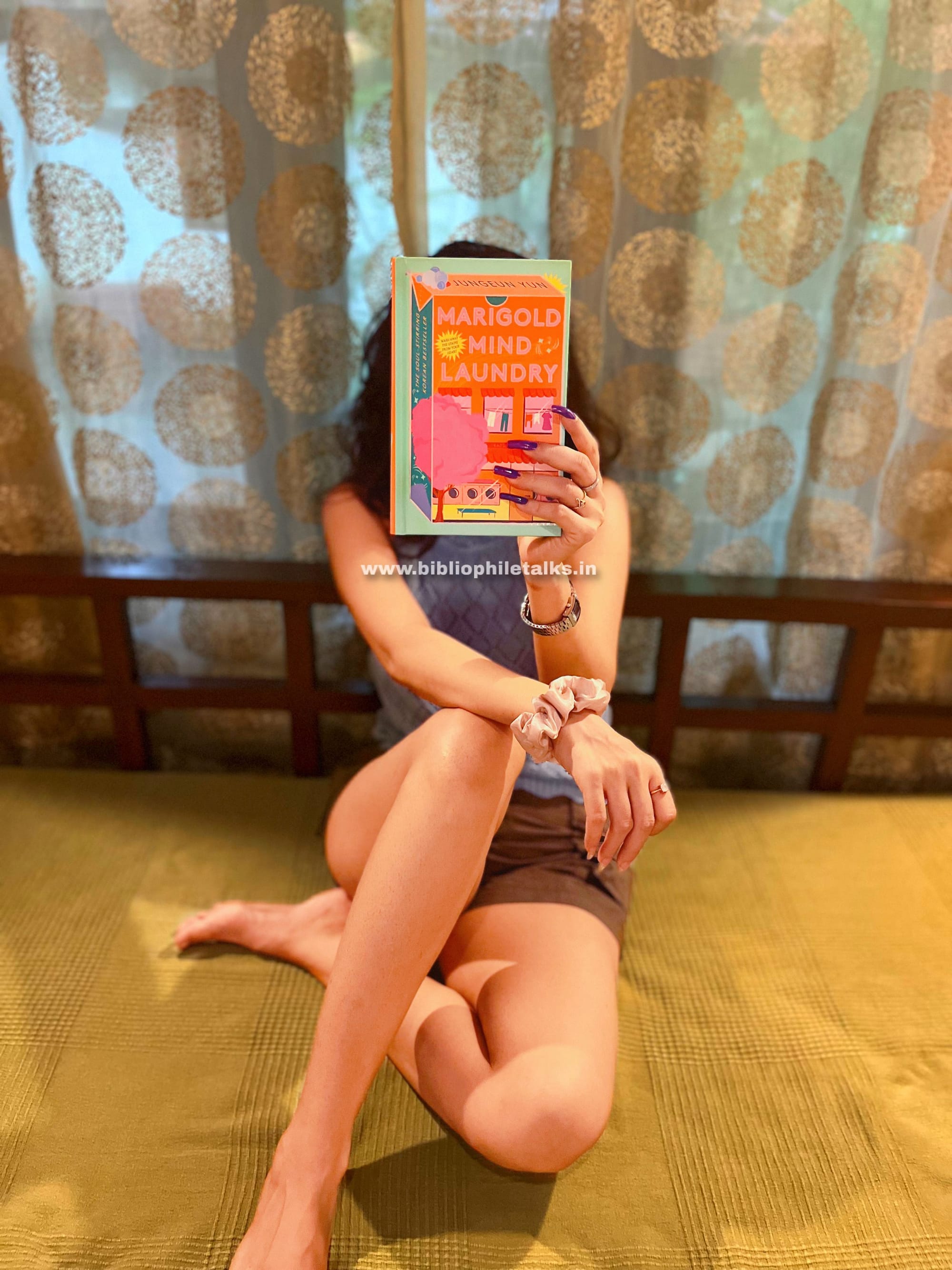MARIGOLD MIND LAUNDRY

𝗠𝗮𝗿𝗶𝗴𝗼𝗹𝗱 𝗠𝗶𝗻𝗱 𝗟𝗮𝘂𝗻𝗱𝗿𝘆
𝗕𝘆 𝗬𝘂𝗻 𝗝𝘂𝗻𝗴-𝗲𝘂𝗻
𝗣𝘂𝗯𝗹𝗶𝘀𝗵𝗲𝗿: 𝗗𝗶𝗮𝗹 𝗣𝗿
𝗣𝗮𝗽𝗲𝗿𝗯𝗮𝗰𝗸: 𝟐𝟕𝟐
𝗣𝘂𝗯𝗹𝗶𝘀𝗵𝗲𝗱: 𝟏𝘀𝐭 𝗢𝗰𝘁𝗼𝗯𝗲𝗿 𝟐𝟎𝟐𝟒
𝗚𝗲𝗻𝗿𝗲: 𝗟𝗶𝗳𝗲 𝗢𝗳 𝗦𝗹𝗶𝗰𝗲
𝗞𝐨𝗿𝐞𝐚𝐧 𝗟𝗶𝘁𝗲𝗿𝗮𝘁𝘂𝗿𝗲
𝗥𝗲𝗮𝗱𝗶𝗻𝗴 𝗬𝗲𝗮𝗿: 𝟐𝟎𝟐𝟓
Jieun, blessed with magic yet burdened by loss, has accidentally lost her parents. In her journey to find them, she lives through many lives, and in this final one, she resolves to ease the burdens of others—washing away their stains, their pain. Each person she encounters carries their own share of troubles, and the narrative makes you empathise with every character she meets.
Thirty-three-year-old Yoo Jaeha and his lifelong friend Lee Yeonhee are the first to witness the laundry house manifest itself from nothing. Jaeha longs to erase memories of a lonely childhood and start anew, while Yeonhee seeks to remove the hurt of betrayal by her boyfriend, though she hesitates to let go of the love they once shared.
Eunbyul, a twenty-three-year-old Instagram influencer, arrives at Marigold after her latest suicide attempt. Through Jieun’s calming tea and gentle counsel, she begins to reconsider the fleeting nature of her influencer identity and opens herself to the possibility of building genuine friendships.
Then there is Hae-in, Jaeha’s friend, who grew up an orphan but carries with him the influence of his parents’ music and photography. Unlike others, he does not wish to erase anything; instead, he offers Jieun his quiet support. Their exchange about cherishing moments beyond photographs is one of the most touching passages in the book.
Other characters also leave their mark. Jaeha's mother, Yeonja, whose life has been full of hardship and resilience, wishes to soften the memories of her painful past. Deliveryman Kim Yeonghui, who suffered bullying, is obsessed with punctuality and validation. His plea to let go of self-blame and obsession with time feels deeply human. His thoughts on poetry—that mistakes leave traces yet give meaning—mirror the essence of life itself.
At the heart of it all is Jieun. She believes she does not deserve happiness and flees whenever she tastes a moment of ordinary joy. Yet, as the story unfolds, she realises that she is not merely healing others but also finding comfort through them.
The language is clear and easy to understand. The narration flows beautifully, and unlike many Korean or Japanese translated works that lean toward slower pacing, this one moves briskly without losing its depth. The narration and translation are so good that the scenes come alive with vivid clarity. The characters are well-developed, their struggles are relatable, and the story is as beautiful as its cover.
There are so many memorable lines about life that you will want to underline—so keep a marker handy while reading. At times, the book reads almost like a self-help or philosophical work, woven into a fictional narrative. And offers profound insights about letting go, being present, and cherishing what truly matters.
I did notice, however, that the book’s Goodreads ratings lean more toward three stars than 4 or 5, which might give some the impression that it’s average. Personally, I gave it a full five stars and now it's my new favourite. If I may speculate, there could be a few reasons why the ratings skew this way:
*Perhaps the heavy presence of philosophy does not appeal to every reader, as not everyone enjoys such intensity in fiction.
* Another reason could be the similarity of Korean names—many beginning with "J”—which might feel confusing to readers unfamiliar with them.
* Lastly, the story is not conventionally cheerful; each character has endured hardships, which may not align with what some readers seek. Despite this, I found that these aspects were one of its greatest strengths, lending it a sense of depth and sincerity.
In conclusion, I wholeheartedly recommend this book—especially to those who enjoy philosophical reflections on life, readers who appreciate “slice of life” narratives, or those who value the wisdom of self-help books but prefer the tenderness of fiction. And of course, it is perfect for fans of "Before The Coffee Gets Cold", "Komogama Food Detectives" and "More Days At Morisaki Bookshop". It is moving, thoughtful, and genuinely one of those books that stays with you long after you turn the last page.
For me, this book was a gem—profound, moving, and unforgettable.
My Rating:
5/5
NOTE: In this blog, the CONTENT and PICTURES are owned by Samayra Singh, and cannot be used or distributed without permission. Strict legal action will be taken against any infringement.